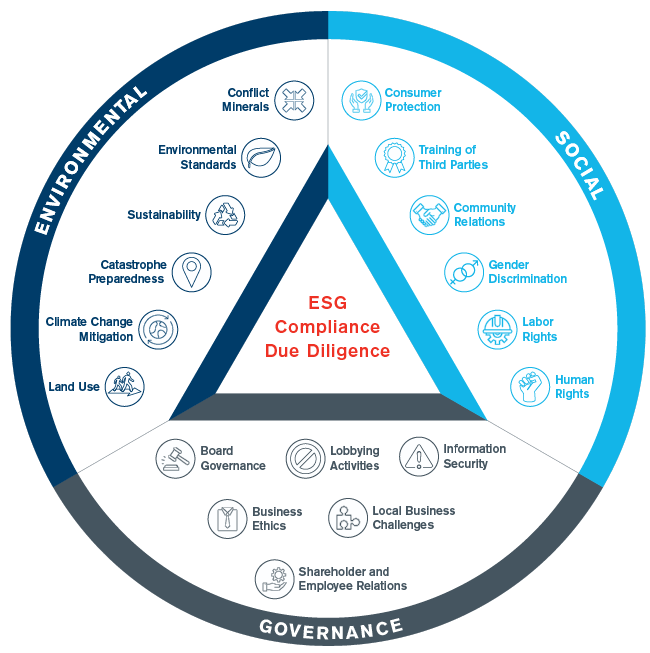ESG stands for environmental, social, and governance – and refers to the three key areas that impact an organization’s long-term sustainability. When making investments, it’s important to consider these factors in order to minimize risk and maximize potential return. But what is ESG due diligence exactly?
In this guide, we’ll cover everything you need to know about what is ESG due diligence and how to incorporate ESG into your investment decision-making process.
By the end of this article, you’ll have a better understanding of how taking a holistic approach toward investing can help create a more sustainable future for us all.
Table of Contents
What is ESG Due Diligence?
ESG due diligence is the process of looking into a company’s policies and practices in the areas of sustainability, social responsibility, and governance.
The goal is to identify and assess any material risks that could impact the business, its stakeholders, or the achievement of its ESG objectives.
ESG due diligence can be used in a variety of situations, including when a company is considering making an investment, issuing debt, or entering into a joint venture.
It can also be used on an ongoing basis to monitor a company’s progress in meeting its ESG objectives.
ESG due diligence typically includes a review of a company’s public disclosures such as its annual report, sustainability report, and website. It may also involve interviews with company officials and other stakeholders and on-site visits.
The process of ESG due diligence can be complex and time-consuming. However, it is becoming increasingly important as investors and other stakeholders start to consider ESG factors when making decisions about where to put their money.
ESG due diligence is not a new concept, but it has gained prominence in recent years as the issue of sustainability has risen to the top of the global agenda.
A growing number of investors are incorporating ESG factors into their decision-making, and companies are under pressure to disclose more information about their policies and practices in these areas.
The benefits of ESG due diligence are clear: it can help companies avoid risks and make better-informed decisions. But the process can be daunting, especially for small and medium-sized companies that may not have the resources to devote to it.
There are a number of ways to make ESG due diligence more manageable, including partnering with other companies or organizations, hiring consultants, or using technology solutions. The most important thing is to start somewhere and to keep moving forward.
The Importance of Incorporating ESG Factors in Investment Decisions
As an investor, it is important to be aware of the various risks and opportunities that are associated with investments. One way to manage these risks is to incorporate environmental, social, and governance (ESG) factors into your investment decisions.
ESG factors are important to consider because they can have a material impact on a company’s financial performance. For example, a company that is not taking steps to mitigate its environmental impact could face significant costs in the future.
Similarly, a company that does not have a diverse workforce could miss out on talent and ideas.
Incorporating ESG factors into your investment decisions can help you to identify risks and opportunities that might not be apparent from financial statements alone.
It can also help you to make more informed and responsible investment decisions.

(Source)
When conducting ESG due diligence, investors should consider the following questions:
- What are the company’s policies and practices in relation to environmental, social, and governance issues?
- How does the company manage and report on its ESG performance?
- What are the company’s risks and opportunities in relation to ESG issues?
- What is the company’s track record in relation to environmental, social, and governance issues?
- What are the views of key stakeholders (e.g. employees, customers, suppliers, community groups) on the company’s environmental, social, and governance performance?
ESG due diligence is an important part of responsible investing. By taking ESG factors into account, investors can make more informed investment decisions.
How to Conduct an Effective ESG Due Diligence Process
What is ESG due diligence?
The first step in conducting an effective ESG due diligence process is to understand what ESG stands for. ESG stands for environment, social, and governance. These are the three pillars that make up a company’s ESG profile.
The next step is to understand what information you should be looking for when conducting an ESG due diligence process.
The most important data points in the sustainability category are the company’s emissions, water usage, and energy consumption.
You should also look at a company’s social and governance practices.
Are they committed to diversity and inclusion?
Do they have strong environmental practices?
Do they have a robust governance structure?
Once you have a good understanding of what data to look for, you need to gather it. The best way to do this is to request it from the company itself. Many companies are now voluntarily disclosing their ESG data, so this should not be too difficult.
If the company is not voluntarily disclosing this information, you can try to find it through other sources such as public filings or third-party data providers.
Once you have gathered all of the relevant data, you need to start analyzing it. This is where you will need to use your judgment to determine if a company’s ESG practices are up to par.
Are their emissions in line with their peers?
Are their social and governance practices best in class?
The last step in conducting an effective ESG due diligence process is to make a recommendation. Based on your analysis, you should recommend whether or not to invest in the company.
If you believe that a company’s ESG practices are strong, then you should recommend investing in the company. If you believe that a company’s ESG practices need improvement, then you should recommend against investing in the company.
Key Considerations for Investors When Conducting Due Diligence
When conducting an ESG DD process, investors should consider a number of key factors in order to make informed decisions.
These include the company’s ESG policies and practices, its ESG performance, and the extent to which its business model is aligned with sustainable development goals.
Additionally, investors should assess the company’s disclosure practices and the robustness of its disclosure process.
Furthermore, it is important to consider the company’s engagement with key stakeholders on ESG issues, as well as its capacity to manage ESG risks and opportunities.
Best Practices for Incorporating Results of ESG Due Diligence
When it comes to making investment decisions, incorporating the results of an effective due diligence process is crucial in order to make sound decisions.
Here are some best practices to follow when incorporating the results of ESG due diligence.
1. Understand the Objectives of the Due Diligence Process
Before incorporating the results of due diligence into your investment decision-making, it is important to first understand the objectives of the due diligence process.
What are you hoping to learn from the due diligence process?
What are your goals and objectives for the investment?
2. Review All of the Information Gathered During the Due Diligence Process
After the due diligence process has been completed, it is important to review all of the information that was gathered. This information can be used to help you make more informed investment decisions.
Pay close attention to any red flags that were raised during the due diligence process, as these can be indicative of potential problems down the road.
3. Discuss the Results of the Due Diligence with Your Team
Once you have reviewed the results of the due diligence process, it is important to discuss the findings with your team. This team can include your financial advisor, investment manager, and attorney.
Discussing the results of the due diligence with your team can help to ensure that everyone is on the same page and that all potential risks have been considered.
4. Make a Decision
After you have reviewed the results of the due diligence process and discussed the findings with your team, it is time to make a decision. This decision should be based on all of the information that was gathered during the due diligence process.
If there are any red flags or concerns, be sure to weigh these factors heavily when making your decision.
Making decisions about investments can be difficult, but incorporating the results of an effective due diligence process into your decision-making can help to ensure that you are making sound investment decisions.
FAQs About What Is ESG Due Diligence
Is ESG part of due diligence?
ESG is not part of traditional due diligence, but it is becoming increasingly important as investors consider environmental, social, and governance factors when making investment decisions.
What is the meaning of ESG?
ESG stands for environmental, social, and governance. It is a term used to describe the three main areas of concern for companies when it comes to sustainability and responsibility.
Environmental issues include things like climate change, pollution, and resource depletion. Social issues include things like human rights, labor standards, and diversity. Governance issues include things like board structure, executive compensation, and shareholder rights.
What does ESG mean in compliance?
ESG regulations have become an increasingly difficult area for businesses to understand and comply with.
What is ESG and why is it important?
ESG stands for environmental, social, and governance. It is important because it is a way to measure a company’s sustainability and its impact on society and the environment.
Conclusion
What is ESG due diligence? As more and more investors are beginning to realize, incorporating ESG factors into your investment decision-making process is crucial in order to create a sustainable future. By conducting effective due diligence and considering all of the key stakeholders involved, you can minimize risk while still maximizing potential return on investment.
{“@context”:”https://schema.org”,”@type”:”FAQPage”,”mainEntity”:[{“@type”:”Question”,”name”:”Is ESG part of due diligence?”,”acceptedAnswer”:{“@type”:”Answer”,”text”:”
ESG is not part of traditional due diligence, but it is becoming increasingly important as investors consider environmental, social, and governance factors when making investment decisions. “}},{“@type”:”Question”,”name”:”What is the meaning of ESG?”,”acceptedAnswer”:{“@type”:”Answer”,”text”:”
ESG stands for environmental, social, and governance. It is a term used to describe the three main areas of concern for companies when it comes to sustainability and responsibility.
Environmental issues include things like climate change, pollution, and resource depletion. Social issues include things like human rights, labor standards, and diversity.u00a0Governance issues include things like board structure, executive compensation, and shareholder rights. “}},{“@type”:”Question”,”name”:”What does ESG mean in compliance?”,”acceptedAnswer”:{“@type”:”Answer”,”text”:”
ESG regulations have become an increasingly difficult area for businesses to understand and comply with. “}},{“@type”:”Question”,”name”:”What is ESG and why is it important?”,”acceptedAnswer”:{“@type”:”Answer”,”text”:”
ESG stands for environmental, social, and governance. It is important because it is a way to measure a company’s sustainability and its impact on society and the environment. “}}]}





